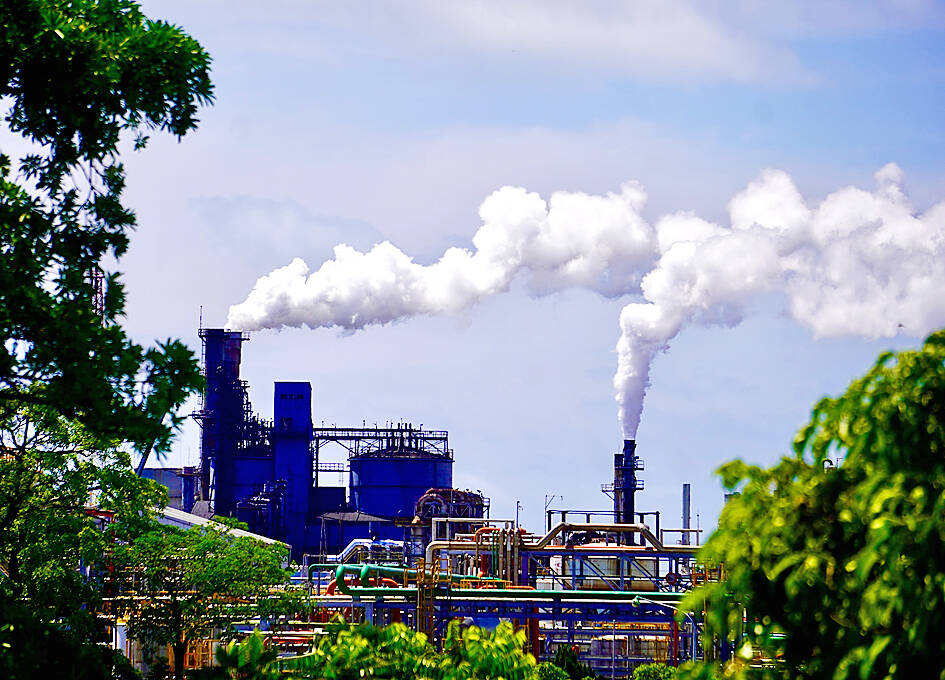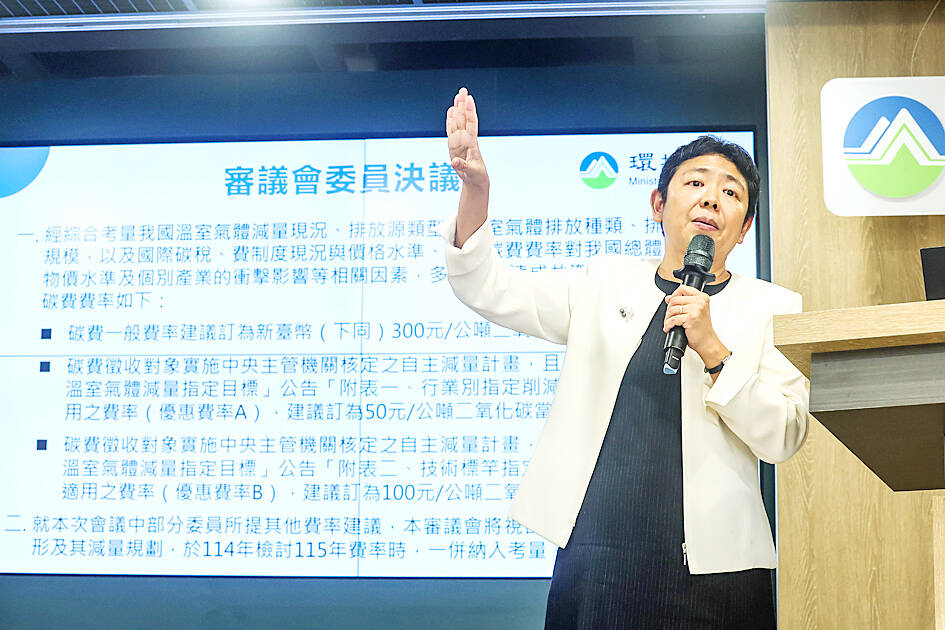A review committee established by the government yesterday recommended setting a basic carbon fee rate of NT$300 (US$9.34) per tonne of carbon emissions.
In addition to the basic rate, preferential rates of NT$50 and NT$100 per tonne were also recommended for companies that meet defined emissions reduction targets, the committee said.
The fees, to be applied initially only to companies emitting more than 25,000 tonnes per year, are expected to be collected starting in 2026, based on actual emissions next year.

Photo: CNA
Next year is to be used as a dry run in which large emitters would only have to report emissions amounts for this year, but would not have to pay carbon fees, the committee said.
The review committee issued its long-delayed recommendations — which still have to be approved by the Ministry of Environment — after reaching a consensus yesterday at its sixth meeting since March.
It had previously said it was considering a basic fee rate in the NT$300 to NT$500 range.

Photo: CNA
The ministry has said that about 500 emitters are expected to meet the 25,000 tonne threshold for paying a carbon fee.
At a meeting in July, the committee reviewed estimates that showed a carbon fee of NT$300 per tonne would lead to a 0.12 percentage point drop in GDP, while a NT$500 per tonne fee would cause a 0.2 percentage point fall.
Every 0.1 percentage point drop in GDP is equivalent to about NT$23.5 billion, based last year’s GDP, the ministry said.
Minister of Environment Peng Chi-ming (彭啟明) said that the ministry is in the process of discussing with relevant agencies the issue of demanding imports for products such as cement and steel to declare carbon dioxide emissions in a bid to protect domestic industry, adding that the plan might be implemented next year on a trial basis.
The ministry would also keep a close eye on details of the Carbon Border Adjustment Mechanism to be unveiled by the EU next year, he added.
Separately yesterday, the Ministry of Economic Affairs said that some local companies are bracing for a negative impact from the upcoming charges on carbon emissions as they are facing higher preferential rates than their Japanese or South Korean rivals.
The preferential charge of NT$100 per tonne is a heavier financial burden compared with their competitors, who are paying NT$64.7 per tonne imposed in Japan and NT$5.7 per tonne in South Korea, the economic affairs ministry said.
“Taiwanese exporters’ competitiveness should be considered,” the economic affairs ministry said.
What is more, as some local manufactures are grappling with losses, such a high levy would heap financial pressure on them, the economic affairs ministry added.
A total of 149 listed companies in the manufacturing sector require to pay the carbon fee, but 33 percent of them are even struggling to eke out a profit last year, it said.
To mitigate the impact, the administration suggested a lower rate between NT$50 and NT$70 in the initial stage, the economic affairs ministry said. The suggestion was denied.
In addition, it is a big challenge for most local businesses to hit their science-based-targets in the short term, if they seek to pay lower pricing as designed by the review committee, it said.
The economic affairs ministry would continue to urge the carbon fee review committee to lower the bar, it added.
As of the end of January, 42 local manufacturers’ carbon reduction targets received science-based-targets approval, mostly large companies such as Hon Hai Precision Industry Co (鴻海精密) and Delta Electronics Inc (台達電).
Additional reporting by Lisa Wang

The Central Election Commission has amended election and recall regulations to require elected office candidates to provide proof that they have no Chinese citizenship, a Cabinet report said. The commission on Oct. 29 last year revised the Measures for the Permission of Family-based Residence, Long-term Residence and Settlement of People from the Mainland Area in the Taiwan Area (大陸地區人民在台灣地區依親居留長期居留或定居許可辦法), the Executive Yuan said in a report it submitted to the legislature for review. The revision requires Chinese citizens applying for permanent residency to submit notarial documents showing that they have lost their Chinese household record and have renounced — or have never

A magnitude 5.6 earthquake struck off the coast of Yilan County at 12:37pm today, with clear shaking felt across much of northern Taiwan. There were no immediate reports of damage. The epicenter of the quake was 16.9km east-southeast of Yilan County Hall offshore at a depth of 66.8km, Central Weather Administration (CWA) data showed. The maximum intensity registered at a 4 in Yilan County’s Nanao Township (南澳) on Taiwan’s seven-tier scale. Other parts of Yilan, as well as certain areas of Hualien County, Taipei, New Taipei City, Taoyuan, Hsinchu County, Taichung and Miaoli County, recorded intensities of 3. Residents of Yilan County and Taipei received

Taiwan has secured another breakthrough in fruit exports, with jujubes, dragon fruit and lychees approved for shipment to the EU, the Ministry of Agriculture said yesterday. The Animal and Plant Health Inspection Agency on Thursday received formal notification of the approval from the EU, the ministry said, adding that the decision was expected to expand Taiwanese fruit producers’ access to high-end European markets. Taiwan exported 126 tonnes of lychees last year, valued at US$1.48 million, with Japan accounting for 102 tonnes. Other export destinations included New Zealand, Hong Kong, the US and Australia, ministry data showed. Jujube exports totaled 103 tonnes, valued at

BIG SPENDERS: Foreign investors bought the most Taiwan equities since 2005, signaling confidence that an AI boom would continue to benefit chipmakers Taiwan Semiconductor Manufacturing Co’s (TSMC, 台積電) market capitalization swelled to US$2 trillion for the first time following a 4.25 percent rally in its American depositary receipts (ADR) overnight, putting the world’s biggest contract chipmaker sixth on the list of the world’s biggest companies by market capitalization, just behind Amazon.com Inc. The site CompaniesMarketcap.com ranked TSMC ahead of Saudi Aramco and Meta Platforms Inc. The Taiwanese company’s ADRs on Tuesday surged to US$385.75 on the New York Stock Exchange, as strong demand for artificial intelligence (AI) applications led to chip supply constraints and boost revenue growth to record-breaking levels. Each TSMC ADR represents